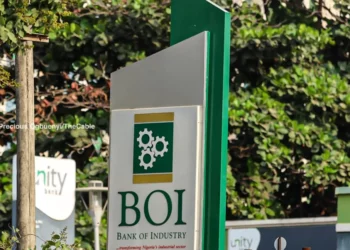For its third edition which held at the Radisson Hotel Ikeja Lagos earlier in December, SBI Media Workshop declared the monumental shifts that blockchain technology could bring to the media industry.
As the world over continues to witness the rapid adoption of and innovation within blockchain technology, facilitators at the workshop agreed that content creators and media entrepreneurs are particularly poised to gain substantially from the many benefits that blockchain has to offer.
SBI Media Workshop, according to its founder, Rotimi Bankole, has identified blockchain technology as a potential gamechanger, and is keen on training young individuals in the industry to leverage blockchain to build profitable careers and businesses in media.
The media industry thrives on networks and communities across its value chain, which means that creators and practitioners might be disadvantaged if they lack training and exposure to the intricacies of intellectual property rights and ownership, business and finance, laws and regulations in their media practice.
However, with the help of blockchain technology, it is believed that media practitioners and creatives could benefit from fraud elimination, definite ownership claims, increased transparency and reduced monitoring costs. These are a few of the identified offerings of blockchain technology to the media industry, which were expanded upon during the workshop.
In his session titled ‘Blockchain Fundamentals: Why It Matters’, Opeyemi Awoyemi, founder of the job site Jobberman and the webhost Whogohost, laid the foundation for the rest of the program by defining blockchain as a tamper-resistant database for storing items of value, and within the context of money or records, it can be thought of as a ledger.
As an investor in at least five blockchain start-ups, Opeyemi expounded on the concept of blockchain. Across media and its expressions in entertainment and other sub-sectors, the issue of ownership and rights management over content remains one of the greatest in the industry.
For centuries, it has been a challenge to effectively identify true ownership of content and materials, and this has often led to lawsuits and payment disputes. Blockchain can remove these issues, Awoyemi predicted.
According to Fisayo Fosudo, YouTuber and tech media entrepreneur, “You can’t claim what’s not yours, what’s yours can’t be claimed and your identity is unique to you and is validated.”
He said this during his session at the workshop where he affirmed that blockchain promises an effective way to track ownership and process payments easily. By using blockchain technology, Fisayo explained that intellectual property rights can be properly tracked, and digital rights management companies can access the full record of transactions made.
Another SBI Media Workshop facilitator, Olubunmi Fabanwo who is the Affiliate Program Manager for Binance Africa and founding partner at Ports Connect, identified other use cases for blockchain technology in media, including streamlined royalty payments, peer-to-peer sales and content distribution, usage-based billing models, and immutable ad metrics.
There is no short supply of propositions for blockchain use cases in media, especially as the industry looks to address many limitations with innovative technological solutions.
In an industry where middlemen are often hindrances instead of enablers, shifting consumer habits, unequal distribution of profits and a myriad of inefficiencies, blockchain is being embraced as it promises disintermediation and the introduction of a more transparent ecosystem all across the value chain.
Many facilitators emphasized this during the workshop while introducing participants to ways they can navigate this for their own benefit and success.
According to Bankole, “these use cases are easy gamechangers and can also facilitate the establishment of new career and business models that will allow the industry progress beyond the challenges that were discussed during the workshop. By offering innovative solutions around micropayments and automated settlements, use of immutable records of data shared between parties, the clarity that blockchain brings to previously ambiguous practices with metrics and results. There is finally something that can deliver a fair deal for all players while creating space for further innovations and progress.”
Olubunmi Fabanwo, expressed this point also when he said, “ultimately, effective use of blockchain could make the media space fairer and more equitable, while also introducing practical advances that change the way that we consume media”.
Certainly, blockchain technology will change the media industry, and its application is already on the rise, locally and globally. There is much room for growth still, in certain areas more than others. For example, piracy is an area that still needs a lot of work to be done, but blockchain is enabling the media industry to reshape itself in ways that make it beneficial for everyone to play fairly and honestly across board.
With the opportunities highlighted for streamlined royalty payments, disintermediation, micropayments and more all pointing to a shift in power back to the creators and consumers, businesses can also leverage this to operate more efficiently and gain competitive edge.





